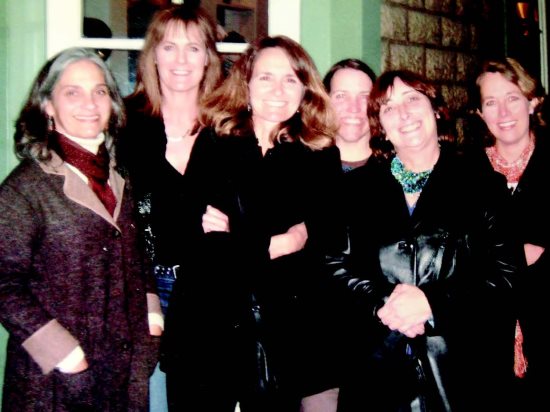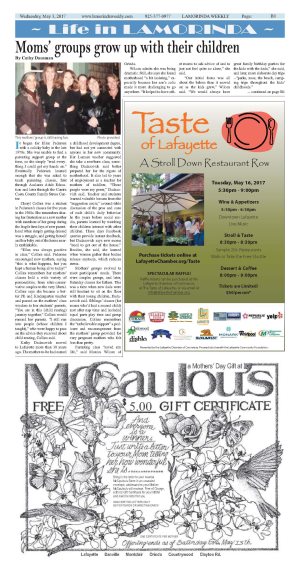| | Published May 3rd, 2017
| Moms' groups grow up with their children
| | | By Cathy Dausman |  | | This mothers' group is still having fun. Photo provided |
It began for Ellen Pedersen with a colicky baby in the late 1970s. She was unable to find a parenting support group at the time, so she simply "read everything I could get my hands on." Eventually Pedersen learned enough that she was asked to teach parenting classes, first through Acalanes Adult Education and later through the Contra Costa County Family Stress Center.
 Cheryl Collins was a student in Pedersen's classes for five years in the 1980s. She remembers sharing her frustration as a new mother with members of her group during the fragile first days of new parenthood when simply getting dressed was a struggle, and getting herself and her baby out of the house nearly unthinkable.
Cheryl Collins was a student in Pedersen's classes for five years in the 1980s. She remembers sharing her frustration as a new mother with members of her group during the fragile first days of new parenthood when simply getting dressed was a struggle, and getting herself and her baby out of the house nearly unthinkable.
 "Ellen was always positive in class," Collins said. Pedersen encouraged new mothers, saying "this is what happens, but you kept a human being alive today!" Collins remembers her mothers' classes held a wide variety of personalities, from ultra-conservative couples to the very liberal. Collins says she became a better PE and Kindergarten teacher and passed on the mothers' class wisdom to her students' parents. "You are in this (child rearing) journey together," Collins would remind her parents. "I still run into people (whose children I taught)," who were happy to pass on the advice they received about child rearing, Collins said.
"Ellen was always positive in class," Collins said. Pedersen encouraged new mothers, saying "this is what happens, but you kept a human being alive today!" Collins remembers her mothers' classes held a wide variety of personalities, from ultra-conservative couples to the very liberal. Collins says she became a better PE and Kindergarten teacher and passed on the mothers' class wisdom to her students' parents. "You are in this (child rearing) journey together," Collins would remind her parents. "I still run into people (whose children I taught)," who were happy to pass on the advice they received about child rearing, Collins said.
 Kathy Dadasovich moved to Lafayette more than 30 years ago. The mother-to-be had earned a childhood development degree, but had not yet connected with anyone in her new community. Her Lamaze teacher suggested she take a newborn class, something Dadasovich said better prepared her for the rigors of motherhood. It also led to years of employment as a teacher for mothers of toddlers. "These people were my peers," Dadasovich said. Teacher and students learned valuable lessons from the "suggestion circle," a round-table discussion of the pros and cons of each child's daily behavior. In the years before social media, parents learned by watching their children interact with other children. These days Facebook queries provide instant feedback, but Dadasovich says new moms "need to get out of the house." Besides, she said, she learned when women gather their bodies release oxytocin, which reduces stress.
Kathy Dadasovich moved to Lafayette more than 30 years ago. The mother-to-be had earned a childhood development degree, but had not yet connected with anyone in her new community. Her Lamaze teacher suggested she take a newborn class, something Dadasovich said better prepared her for the rigors of motherhood. It also led to years of employment as a teacher for mothers of toddlers. "These people were my peers," Dadasovich said. Teacher and students learned valuable lessons from the "suggestion circle," a round-table discussion of the pros and cons of each child's daily behavior. In the years before social media, parents learned by watching their children interact with other children. These days Facebook queries provide instant feedback, but Dadasovich says new moms "need to get out of the house." Besides, she said, she learned when women gather their bodies release oxytocin, which reduces stress.
 Mothers' groups evolved to meet participants' needs. There were couples groups, and later, Saturday classes for fathers. This was a time when new dads were still hesitant to sit on the floor with their young children, Dadasovich said. Siblings' classes (for moms who'd had a second child) met after nap time and included equal parts play time and group discussion. Collins remembers the "unbelievable support" a pedicure and encouragement from the mothers' group provided for very pregnant mothers who felt less than pretty.
Mothers' groups evolved to meet participants' needs. There were couples groups, and later, Saturday classes for fathers. This was a time when new dads were still hesitant to sit on the floor with their young children, Dadasovich said. Siblings' classes (for moms who'd had a second child) met after nap time and included equal parts play time and group discussion. Collins remembers the "unbelievable support" a pedicure and encouragement from the mothers' group provided for very pregnant mothers who felt less than pretty.
 Parenting class "saved my life," said Monica Wilcox of Orinda.
Parenting class "saved my life," said Monica Wilcox of Orinda.
 Wilcox admits she was being dramatic. Still, she says she found motherhood "a bit isolating," especially because her son's colic made it more challenging to go anywhere. "It helped to have other moms to ask advice of and to just not feel quite so alone," she said.
Wilcox admits she was being dramatic. Still, she says she found motherhood "a bit isolating," especially because her son's colic made it more challenging to go anywhere. "It helped to have other moms to ask advice of and to just not feel quite so alone," she said.
 "Our initial focus was all about the babies then it moved on as the kids grew," Wilcox said. "We would always have great family birthday parties for the kids with the dads," she said, and later, more elaborate day trips --"parks, zoos, the beach, camping trips throughout the kids' childhoods."
"Our initial focus was all about the babies then it moved on as the kids grew," Wilcox said. "We would always have great family birthday parties for the kids with the dads," she said, and later, more elaborate day trips --"parks, zoos, the beach, camping trips throughout the kids' childhoods."
 "There are six of us in the 'baby group' even now," Wilcox says, after more than 23 years and lots of changes. "We've managed to stay a group of good friends. We see each other four to six times a year still." Wilcox says the initial new mother bond, plus "a shared love of the outdoors, good books, museums, spirited discussions, and a good glass of wine" kept the group together. As a NICU nurse, Wilcox says she encourages the mothers whose children she cares for to reach out to other new moms when they leave the hospital. "It can be a lifeline," she says.
"There are six of us in the 'baby group' even now," Wilcox says, after more than 23 years and lots of changes. "We've managed to stay a group of good friends. We see each other four to six times a year still." Wilcox says the initial new mother bond, plus "a shared love of the outdoors, good books, museums, spirited discussions, and a good glass of wine" kept the group together. As a NICU nurse, Wilcox says she encourages the mothers whose children she cares for to reach out to other new moms when they leave the hospital. "It can be a lifeline," she says.
 These Lamorinda mothers' children are now all grown, some with children of their own, but many original mothers still stay in touch. "We didn't all go our separate ways," Dadasovich says. Babysitting co-op members from decades ago send Christmas cards or catch up at chance meetings across town. A group of former Lafayette Elementary School mothers who began walking the reservoir on Fridays when their children were young still find the time to bond over walks or day trips. Decades after the demands of a newborn, the terrible twos, the trying threes, the ferocious fours and the tricky teen years, social bonding...and the oxytocin it provides...is its own reward.
These Lamorinda mothers' children are now all grown, some with children of their own, but many original mothers still stay in touch. "We didn't all go our separate ways," Dadasovich says. Babysitting co-op members from decades ago send Christmas cards or catch up at chance meetings across town. A group of former Lafayette Elementary School mothers who began walking the reservoir on Fridays when their children were young still find the time to bond over walks or day trips. Decades after the demands of a newborn, the terrible twos, the trying threes, the ferocious fours and the tricky teen years, social bonding...and the oxytocin it provides...is its own reward.


|
| | | | | | | | | | | | |



